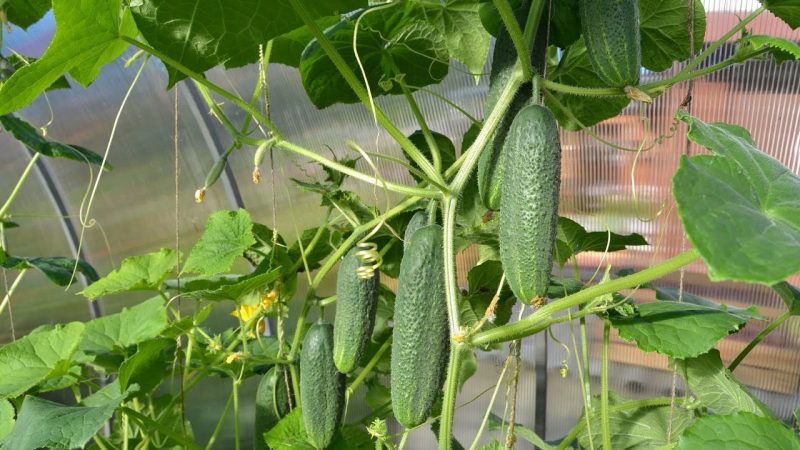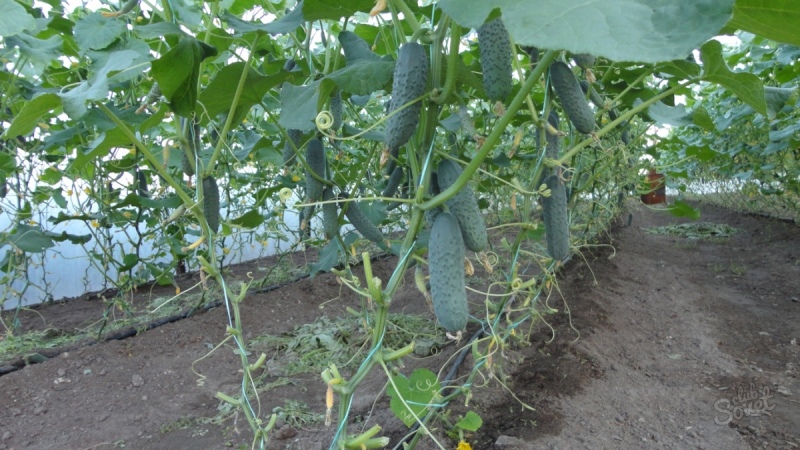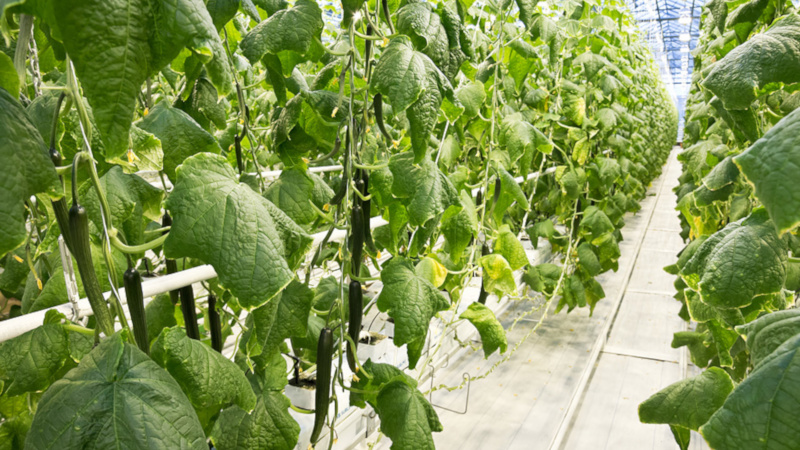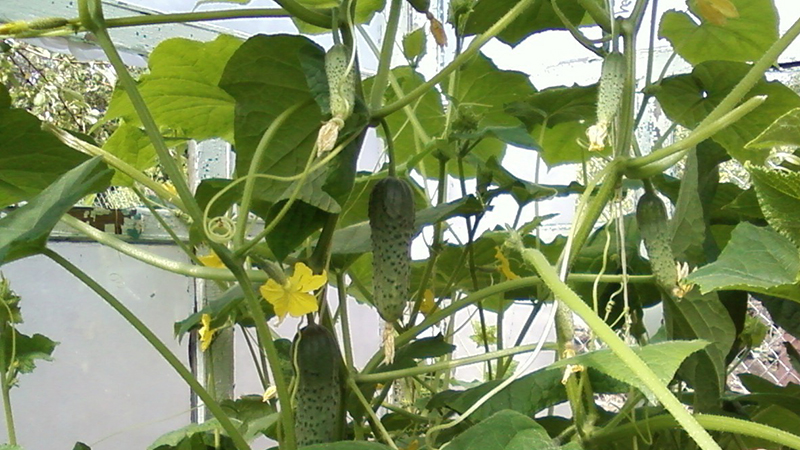What if the cucumbers from the greenhouse are bitter and why does this happen?
Cucumbers require careful care and attention. An unpleasant feature of cucumbers is the appearance of the bitter taste of the fruit. Why cucumbers in a greenhouse are bitter and what to do to prevent this problem, you will learn from this article.
The content of the article
Reasons for the appearance of bitterness in cucumbers
In cucumbers, as in all vegetables of the Pumpkin family, the content of cucurbitacin is genetically incorporated. This substance is distributed throughout all parts of the plant, from roots to fruits.
Cucurbitacin is very useful: it helps seeds germinate faster, increases their germination, repels pests, and makes plants more resistant to stress. When the content of cucurbitacin is small, it has a beneficial effect on the body - anti-inflammatory, antiglust.

However, as the concentration of this substance increases, the fruits become bitter. Which leads to high amounts of cucurbitacin:
- wrong choice of seeds for planting;
- too dry and hot climate;
- unsuitable soil composition;
- cold water for irrigation;
- bacteria and pests;
- too abundant or, conversely, insufficient watering;
- temperature changes;
- lack of fertilizers, improper feeding;
- cucumbers grow too thick;
- the stems are twisted together.
How to remove bitterness from cucumbers
Cucurbitacin is more concentrated in the peel and tip of the cucumber near the stalk, so peel and trim the ends. If the pulp is bitter, lightly salt the cucumber before use.
Soaking the fruit in warm water will help get rid of the bitterness, like any heat treatment. If these methods do not work, use these vegetables for canning, pickling, or pickling. With this treatment, the bitterness will disappear.
How to prevent bitterness
So that cucumbers do not disappoint with their bitterness, it is better to take care in advance of preventing the appearance of an unpleasant taste.
Soil and fertilizing
The soil for cultivation should be light, fertile, loose and well fertilized. Clay or sandy are not suitable: cucumbers grow poorly on such soil and bitter much more often. If you have such soil in a greenhouse, remove the top layer and replace it with more fertile soil..
Be sure to add fertilizers containing potassium, nitrogen and phosphorus to the soil for proper nutrition of vegetables. Observe the dosage: if you exceed the nitrogen concentration, this will also lead to bitterness. Neglect of feeding and lack of trace elements also badly affect the taste of the fruit.
Reference. Urea or potassium nitrate fertilize bushes in the early stages of development. Then they are fed with mullein or chicken droppings.
Seeds for planting
If you are growing cucumbers for seeds, take them from the front of the fruit. Bitter cucumbers often grow from seeds taken from the back, closer to the stalk.
Hybrid varieties are selected from purchased seeds. The newest hybrids do not taste bitter and do not form voids inside the fruit.
Experienced summer residents and experts do not recommend using seeds of varieties: Vyaznikovsky, Nezhinsky, Muromsky. They almost always grow up with an unpleasant bitter taste.

To grow delicious juicy cucumbers, buy varieties:
- Son-in-law;
- April;
- Ginga;
- Marina Grove;
- Masha;
- Quadrille;
- Clean ponds;
- Ant;
- Buyan;
- Benefit;
- Egoza.
These varieties are also resistant to unfavorable growing conditions.
Important! Plant the seedlings in the greenhouse after 4 leaves appear on the bushes in the heated, prepared soil. The air in the greenhouse should warm up to + 18 ° C.
Watering and moisturizing
Lack or excess of moisture is the main reason for the appearance of bitter cucumbers. Therefore, carefully monitor the condition of the soil and do not allow it to dry out. Cucumbers love warmth; don't pour cold water on them. Ideally, the water for irrigation should be + 22 ... 24 ° C. For timely heating of water, a barrel of water is placed in the greenhouse so that the water in it is always warm.
If the weather is hot for 4-5 days in a row, the number of bitter fruits increases dramatically. Therefore, if you do not have the opportunity to water the cucumbers in a timely manner, install drip irrigation. Increase your watering frequency in hot weather if the cucumbers are planted in a polycarbonate greenhouse.
Outdoors, cucumbers also need regular watering. Water more often in very hot weather, and cover with plastic wrap for extended rains. Excess moisture leads to root rot and death of plants.
Council. Water the bushes under the root with a watering can. You can also water from a hose or bucket, but make sure that the pressure is minimal. So it will not wash the soil and strip the roots.
Temperature regime in the greenhouse
Protect cucumbers from temperature extremes day and night... This happens a lot, especially in Siberia, and it puts the plants under stress. Until the bushes bear fruit, the optimum temperature during the day is + 20 ° С, at night - + 18 ° С. During the fruiting period, the maximum daytime temperature is + 27 ° С, night - + 20 ° С.
To equalize the average daily temperature, the greenhouse is ventilated during the day and closed at night. Hypothermia also leads to stress. Therefore, do not open the greenhouse when it is cold outside.
Correct lighting
The reason for the bitterness also lies in improper lighting in the areas where cucumbers are grown. It is a thermophilic plant, but excess sunlight can harm the bushes, leading them to stress.
Sunlight should be diffused... For this, the walls of the glass greenhouse are painted over with lime or chalk. A greenhouse made of film is covered with a darker colored film on top. Light in a polycarbonate greenhouse does not need to be scattered additionally, its walls protect cucumbers so well from excess sunlight and cold.
Additional artificial lighting is not required for cucumbers. During the day, cucumber beds should be lit for at least 12 hours. Cucumbers should spend at least 6 hours a day in complete darkness, otherwise the bushes will lag behind in development, and the flowers will fall off.

Shoot care
Cucumbers are often attacked by aphids, whiteflies, bears, spider mites and other pests, and also suffer from fungal and infectious diseases... This also causes bitterness. Therefore, when pests appear, take action immediately. For example, treat the bushes with an infusion of onion peel or tobacco dust.
Thin seedlings that are too dense if you plant seeds directly into the ground. Cucumber bushes require a lot of space for full growth. The distance between plants should be 20 cm, and between rows 40 cm.
Get rid of weeds. They take up most of the nutrients and moisture, which leads to the appearance of bitterness in cucumbers. In addition, weeds attract pests.
Plant tall plants such as corn or sunflowers outdoors next to cucumbers. They serve not only as additional shading, but also as a support for the bushes.
Timely harvest

During the period of active fruiting, cucumbers are harvested at least every 2-3 days. If you pick the fruits less often, even once every 5 days, they will overripe and begin to taste bitter. For the same reason, voids can appear in cucumbers. Such fruits taste unpleasant and are not suitable for salting.
How to grow cucumbers without bitterness: advice from experienced gardeners
We offer some tips from experienced gardeners:
- Do not use fresh manure as top dressing. Better to add it to the soil in the fall while digging the earth.Then by the next season its concentration will decrease, and such fertilization will bring more benefits.
- You can find out in advance whether the cucumbers will taste bitter even before the fruits appear. To do this, rip off a leaf, squeeze the juice out of it and taste it. If the juice is bitter, then the fruit will be bitter. In this case, either the bushes do not have enough moisture, or the temperature in the greenhouse is uncomfortable.
- Try the first ripe cucumber. Its taste will also tell you if the next fruit will be bitter. Before they appear, you will have time to find and eliminate the cause of the bitterness.
- Mulch the soil after watering. Use cut grass or hay to do this. This allows moisture to evaporate more slowly and the soil remains protected from drying out. Simply place bunches of dry grass or hay under each bush and water on top.
Conclusion
In order not to regret the energy spent during the harvest of cucumbers, immediately after planting, start monitoring the condition of the soil, the temperature of the water and air. Protect bushes from insects and weeds. Only then the cucumbers will not be bitter and will delight you with a fresh taste.